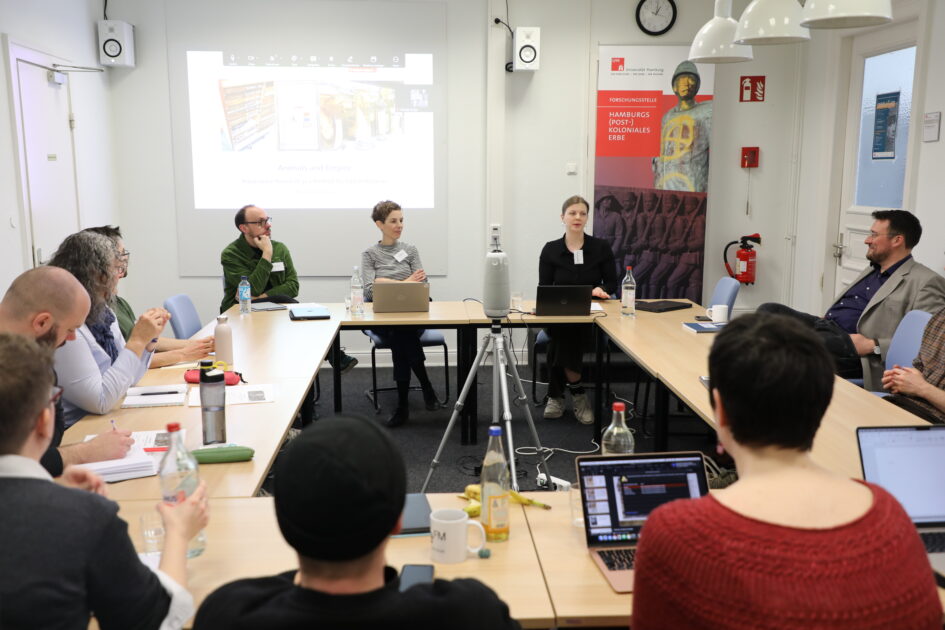In the course of recent debates on provenance research on objects and collections from colonial contexts, zoological collections and their colonial histories are also increasingly coming under scrutiny. Against this background, the workshop “Animals and Empire. Provenance Research as a Method for Global Histories” took place at the Research Center „Hamburg’s (post-)colonial Legacy“ on the 20th and 21st of march 2025.
The aim of the workshop was to facilitate an exchange between historians who are investigating the colonial provenance and histories of specimens in zoological collections. The debates were organized around three key questions: Firstly, how does historical research on colonial zoological collecting facilitate new perspectives on colonial and environmental history, as well as for the history of science and knowledge? Secondly, what methodological challenges do historians and provenance researchers face in zoological collections? And thirdly, how do public debates about addressing colonial history and anthropogenic biodiversity change influence research about collections of natural objects? Within the framework of these questions, the participants were given the opportunity to workshop their projects as well as for mutual feedback and exchange.
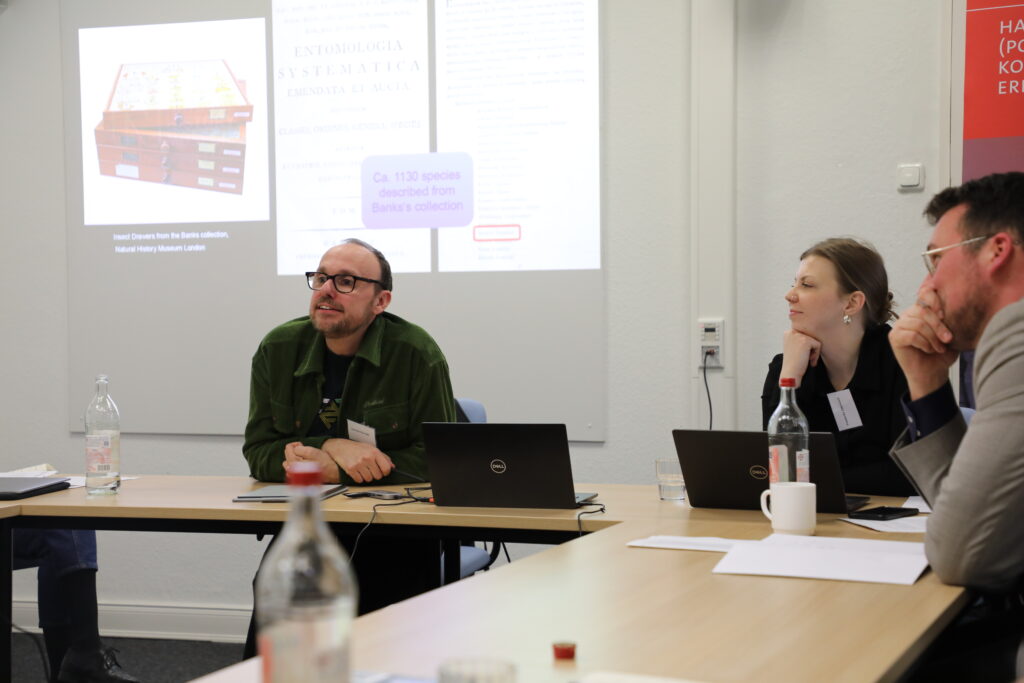
The program began with two methodological inputs from experts in the field of research on zoological collections. Dr. Ina Heumann (Berlin) presented her work in the interdisciplinary research department “Humanities of Nature” at the Museum für Naturkunde Berlin, in particular on the dinosaur fossils from Tendaguru, Tanzania, and argued that provenance research and the question of the contribution of colonized actors to the collecting process must go hand in hand with research into resistance to collecting as an extractive process. Dr. Dominik Hünniger (Hamburg) drew on his experience in the “Collection Ecologies Research Collective”, which he co-founded, and presented its approach, in which collections and museums are viewed as ecosystems. He showed, how in this perspective, different types of relationships and categorizations come into view, which allow for creative intervention within these institutions.
This was followed by four thematically structured panels. The first panel, moderated by Dr. Kim Sebastian Todzi (Hamburg), focused on actors and networks of colonial zoological collecting. The three presentations revolved around by three so-called “collectors”: While Dr. Gudrun Bucher (Braunschweig) centered her attention on Otto Finsch’s somewhat typical biography of a collector working between colonial politics and scientific endeavors, primarily in the South Pacific, Friederike Odenwald (Hamburg) explored the collection practices employed in colonial Namibia by the Hamburg based zoologist specializing in oligochaetes, Wilhelm Michaelsen. Finally, Qijun Zheng (Paris) took the French Lazarist priest Armand David’s expeditions into late Qing era China as a starting point to discuss how his taxonomies overwrote Tibetan and Chinese knowledge systems. The different backgrounds of these actors opened up perspectives on scientific, commercial, religious and political motivations, institutions and networks that influenced collecting. This came back to the central question of what constitutes “colonial contexts”, as it is called in provenance research, and how the focus on zoological collecting relates to broader questions of colonial history.
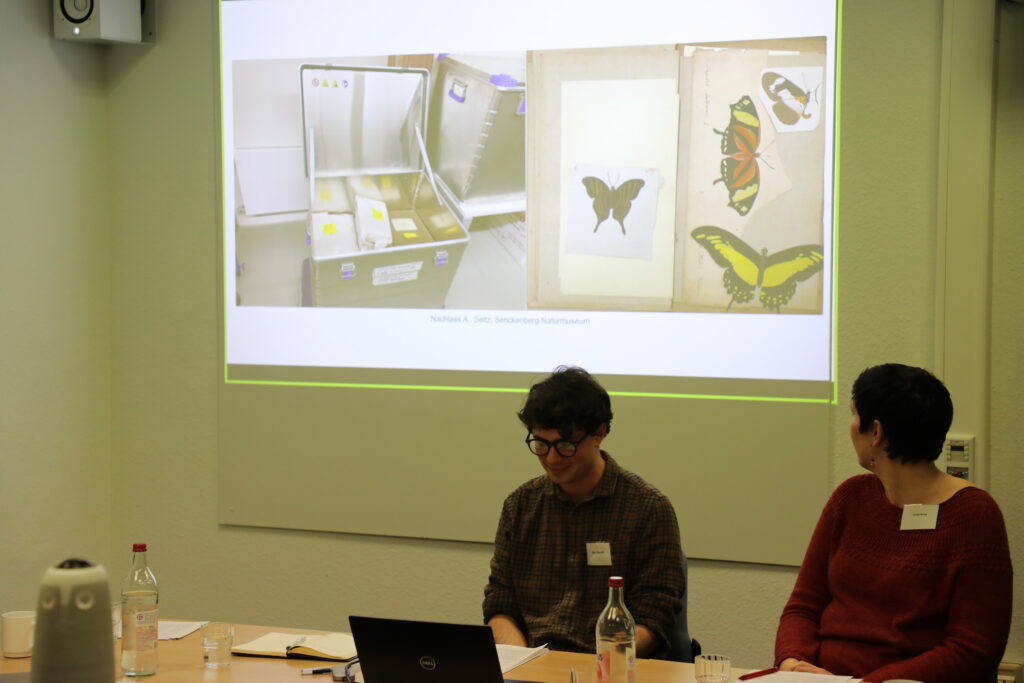
The second panel addressed ways and means of curating, mediatizing and popularizing collected animals from colonial contexts. The panel was moderated by Dominik Hünniger. The three presentations focused on different objects and forms of representation. While Sarah Csernay (Bern/Zurich) examined the history of dioramas with taxidermy “animals of Africa” in the Bern Natural History Museum linking the public interest in African fauna in Switzerland to practices of big game hunting in colonial Africa, Silas Edwards (Giessen) looked at the boom in popular identification guides for butterflies in the late 19th century and the underlying labour dynamics of the global moth and butterfly trade. Finally, Maximilian Preuss and Linda Knop (both Kassel) discussed the specificity of hunting trophies which are kept in many museums but are rarely exhibited, as they are considered as particularly ‚problematic‘. In particular, they showed how they combine their provenance research on these trophies with partnerships with various African organizations and institutions. The three presentations were united by the question of the role of aesthetic criteria and practices in interaction with economic, political and cultural dynamics.
Gudrun Bucher moderated the third panel, which focused on collecting institutions. Callum Fisher (Berlin) reported on his research into the famous Hamburg Museum Godeffroy, whose collections were divided at the end of the 19th century and dispersed to numerous other museums, when the Godeffroy company went bankrupt. He argued that, in addition to examining the colonial provenance of the objects in the Godeffroy trade networks, it is also important to draw new and creative connections between the collections, the objects and the people who work with them today. Dominik Spörker (Vienna) focused on a completely different collecting context, namely the military and also the special case of the Habsburg monarchy as an unsuccessful colonial power. He looked at the cooperation between the Austrian navy and the Court Museum in Vienna, the role of military physicians as collectors and traces of resistance in the collections. The presentations of both panellists offered reflections on the connections between the past and present of collecting institutions, as well as the limitations of perspectives on provenance.
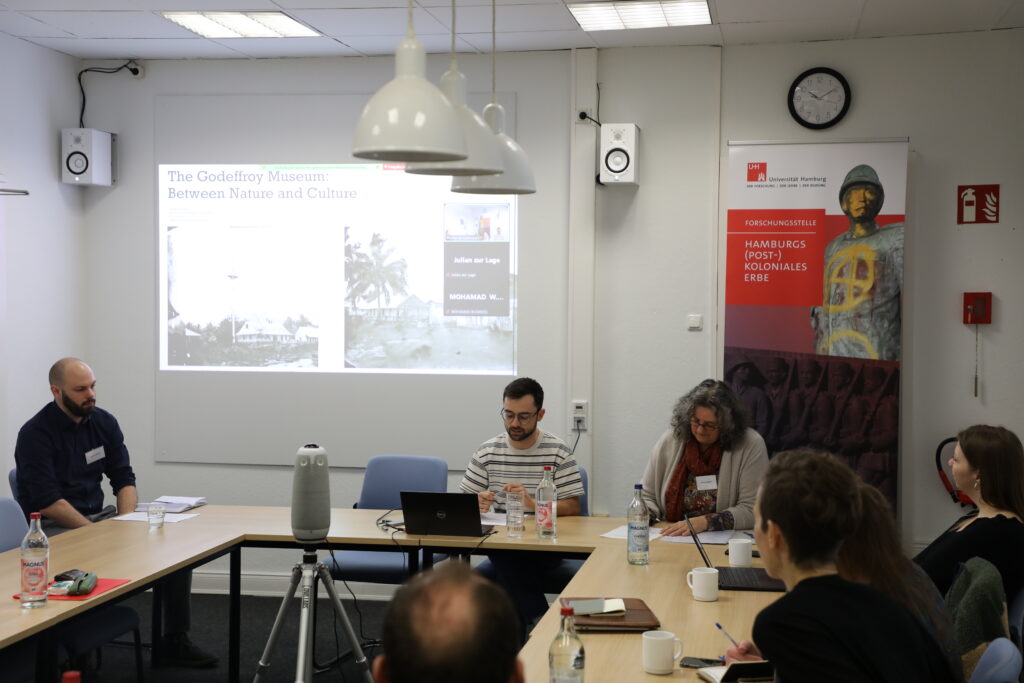
The last panel of the workshop, which was moderated by Ina Heumann, focused on epistemologies and taxonomies. Mohamed W. Fareed (Cairo/Sharjah) focused on three European zoological expeditions to Egypt and made a strong call for a decolonization of zoological collections by looking at Egyptian actors who tried to strengthen Egyptian agency in local collections and museums early on as well as at persisting eurocentrism. Marie Schreier (Tübingen) explored the history of human-tortoise interactions on the basis of turtle and tortoise specimens in Early Modern Collections, notably from the Spanish Empire, raising the question of the role of indigenous knowledge on these animals in the Americas. Finally, Chenchen Yan (Princeton) explored the role of domesticated and bred animals and the notion of „pedigree“ in European scientific taxonomies by focusing on a collection of Pekingese dogs. She showed how the Pekingese was constructed as a “Chinese dog breed” and how this was linked to eugenic discourses at the time.
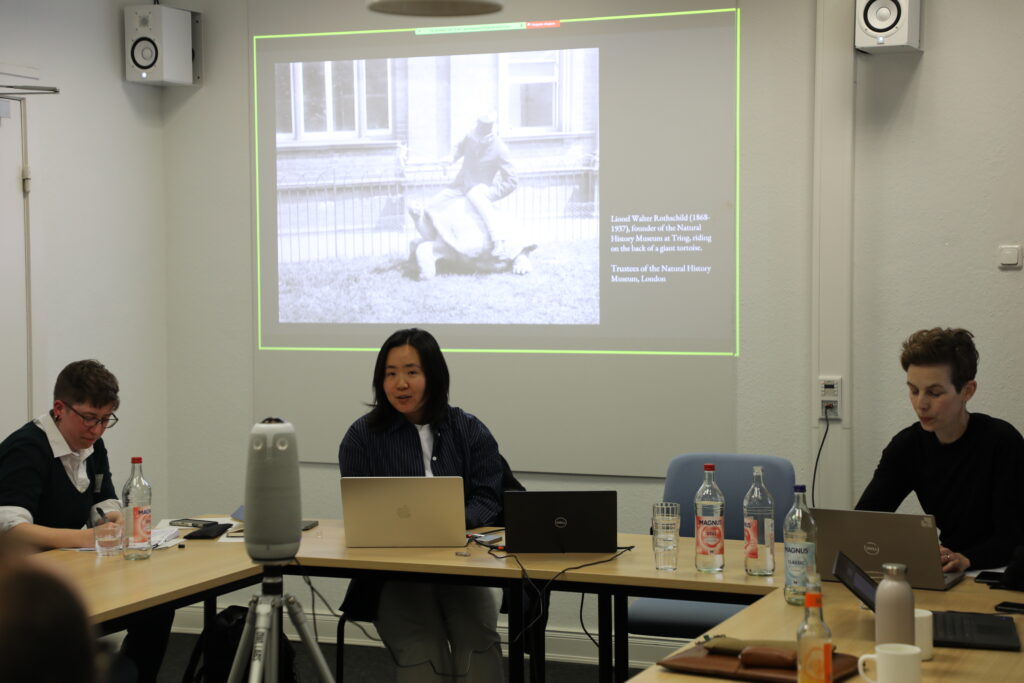
The panels sparked thought-provoking discussions, including on the central theme of the workshop – the role, advantages but also the limitations of the provenance research approach as situated somewhere between scientific method, applied research and political discussions on how to deal with colonial collections and the restitution question. This ranged from questions of research practice to more methodological and theoretical questions such as how provenance research can overcome Eurocentric, racist and colonial biases. Additionally, narratives of “scientific” collecting were a repeated point of discussion, for instance, how “scientificity” functioned as a legitimation strategy in extractive collecting processes and how this relates to the role of science in colonialism as well as in greater narratives of technological and societal progress. The underlying motive was the ambivalence of zoological collections – which on the one hand can claim great scientific relevance in the current biodiversity crisis, but on the other hand are the result of a colonial history of extraction that is still not dealt with enough.
Many thanks to all contributors and participants in the discussion!
All photos © Maik Furmanek, Nils Lehmann and Rose Richter
For the full program, see here.

